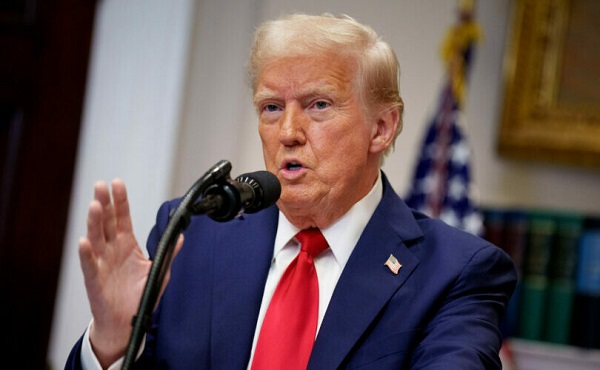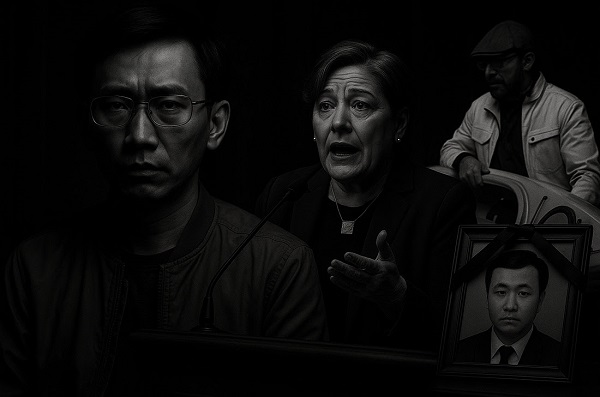By Frank Wright
The Trump administration is pursuing a clean break with the approach of the last 70 years. Perhaps the only hope for peace lies in breaking the rules of the old rules-based order.
As Donald Trump publishes a stark warning to Hamas, news emerges that his administration is also engaged in direct negotiations with the militant group to secure a lasting peace deal in Gaza.
A statement released on Trump’s Truth Social account and by the White House reads:
“Release all of the Hostages now, not later, and immediately return all of the dead bodies of the people you murdered, or it is OVER for you. Only sick and twisted people keep bodies, and you are sick and twisted! I am sending Israel everything it needs to finish the job, not a single Hamas member will be safe if you don’t do as I say.”
The statement followed Trump’s meeting at the White House with some of the Israeli hostages released following a deal brokered by his initiatives and led by Trump’s envoy Steve Witkoff.
“We believe you have been sent by God to save us,” Trump was told. Israel media reported hostage relatives asking, “Why does Witkoff (Steve Witkoff, US Envoy to the Middle East) answer us but not our own ministers?”
Trump is credited by the released hostages and their families with saving their lives, whilst Israeli leader Netanyahu has been accused of having “sabotaged” every hostage deal for the past year, with his own national security minister saying Netanyahu “sacrificed the hostages for his own personal interests” in January. The deal to release the hostages was secured because Trump “pressured” Netanyahu into accepting it, Israeli sources say.
Donald Trump’s message to Hamas and to the people of Gaza was stark:
“This is your last warning! For the leadership, now is the time to leave Gaza, while you still have a chance. Also, to the People of Gaza: A beautiful Future awaits, but not if you hold Hostages. If you do, you are DEAD!”
Yet an exclusive report from Axios yesterday showed the Trump administration is also engaged in secret and direct negotiations with Hamas.
“The Trump administration has been holding direct talks with Hamas over the release of U.S. hostages held in Gaza and the possibility of a broader deal to end the war, two sources with direct knowledge of the discussions tell Axios.”
The White House confirmed the historic move.
Direct talks with Hamas were described by Reuters as having broken a “long- standing diplomatic taboo,” with their report also noting the Israeli response to the news.
“Prime Minister Benjamin Netanyahu’s office issued a statement saying: ‘Israel has expressed to the United States its position regarding direct talks with Hamas.’ It did not elaborate but Israel, which along with many other countries considers Hamas a terrorist organization, refuses to negotiate directly with the group.”
The pursuit of direct bilateral talks with the “enemy” here mirrors the approach pursued by the U.S. in reopening and normalizing diplomatic channels with the Russians – suspended by the Biden administration for around three and a half years.
Russian Foreign Minister Sergei Lavrov said earlier this week it was notable that “normal conversation” had resumed between his nation and the U.S.
The return of direct diplomacy is a signal that the Trump administration is serious about peace, and whilst stressing its power to respond with overwhelming in force in both theaters of war, has been willing to engage with the Russians and with Hamas to break the deadlock.
This is a significant departure from the decades of policy which produced escalation, emergencies, and periodic wars in place of rational compromise and peace.
Israeli commentator Ori Goldberg, a former academic in Middle East Studies, framed the situation as a choice between a leader who is for peace, and another who is for war.
Trump’s direct threats in public are partnered with direct negotiations in private, with the goal seemingly to return hostages and remove the leadership of Hamas from Gaza. It is likely these negotiations will feature the vastly higher number of Palestinian hostages held by the Israelis, whose appalling treatment has included rape with metal rods – a practice endorsed in the Israeli parliament and discussed favorably on Israeli daytime TV.
The ultimatum to Hamas follows Trump’s “Mar-A-Gaza” plan for the reconstruction of the Gaza Strip along the lines of a holiday resort, which would seemingly entail the mass expulsion of the Palestinian population.
In response to this proposal, which has been met with widespread condemnation and outcry, Arab leaders have produced an Egyptian-led counter-proposal for the future of Gaza, involving $35 billion of Arab-led investment. This plan, rejected by the Israelis, would see Egypt assume security supervision of Gaza in place of Hamas, and would permit the Palestinians to remain in Gaza as reconstruction is undertaken. U.S. national security spokesman Brian Hughes said the plan, which will be presented to Trump in the coming weeks, did not recognize that Gaza was now “uninhabitable.”
Meanwhile, the crisis flowing from Netanyahu’s actions – and inaction – undertaken to consolidate his grip on power continues to develop. Controversy over the failings of the Israeli government and army to prevent the October 7 attacks continues to deepen.
The new IDF (Israeli army) chief of staff, ignoring Netanyahu’s strong opposition, has ordered a “re-examination” of the army’s actions during the October 7 attacks. The previous army chief, Herzi Halevi, has resigned – citing his and the Netanyahu government’s failure to protect Israelis.
Netanyahu “dismissed” a warning from Shin Bet, the Israeli security service, issued five months in advance of the attacks, as Haaretz reports. Whether Netanyahu deliberately sabotaged the hostage deal, or refused to act on warnings about October 7, the Israeli leader is beset with questions he refuses to answer.
He is increasingly being seen, inside and outside Israel, as the main problem, being implacably opposed to any attempts to find solutions that would give several decades oppressed Palestinians any new rights and their own state.
Having been in power for most of the last 16 years, Netanyahu can be charged not only with corruption, but with having managed Israel into what has become an existential crisis the tiny nation has never before experienced to this degree. His political future, very similar to that of also corrupt, Jewish Ukrainian president Zelensky, appears to be staked on making any lasting peace impossible.
The reality behind the headlines once again reveals the development of a new geopolitical order beneath the sensational chaos of the current news cycle.
The Trump administration is pursuing a clean break with the approach of the last 70 years. That consistent pattern of repeatedly broken agreements, war crimes, propaganda, atrocities, and ruinous regime change has been part of the process intended to sabotage any chance of peace through periodic escalations and a permanent state of emergency punctuated by all-out war.
After decades of politics dominated by an ongoing death machine, perhaps the only hope for peace lies in breaking the rules of the old rules-based order and placing the protection of ALL innocent human lives as the top priority.
Related


















